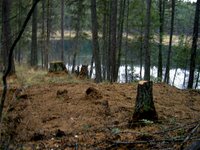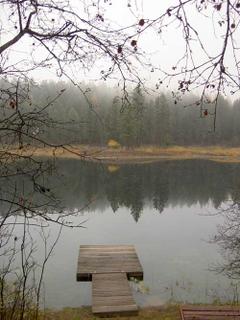The sky was thick and dark over that quaint Montana town,
when Hogg rolled in mad as hell from sleeping on the ground.
A cold rain fell the night before, and he was mighty wet,
but what made him so damn mean was it soaked his cigarettes.
He rumbled up to the Buckhorn bar and spit on the sidewalk,
the Harley taking up two spots, but that’s the way he parks.
Now Lilly May was tending bar, watching football on TV,
she’d just told Mel, the regular, the Eagles, were too goddamn sissy.
Everybody, meaning just the two, turned when Hogg stomped in.
Lil looked back at the tube, “Them Steelers gonna win.”
“A pack of Marlboros, red,” Hogg yelled out at the room,
and if I had whisky now, it wouldn’t be too soon.”
Lilly say’s “Too bad cowboy, all we got is lights”
And Hogg says, “God damn you all,” like he was achin’ for a fight.
“Here’s your whisky,” Lilly slammed the shot glass down,”
Hogg says, “What the Hell you call this here god-forsaken town?”
Lilly didn’t say a thing, just turned up the TV.
“I asked you a question, bitch, or didn’t you hear me”.
When Lilly looked back she squinted with a scar across her face,
A cut from many years ago when she worked at Harold’s place.
Now outside the wind got to howlin, and snow began to fall,
then some tin slammed by real quick, like it been hit with a wrecking ball.
“It’s gonna be a rough one,” Ol Mel said, adjusting in his seat,
and out the window he couldn’t see the buildings across the street.
“Not a good day to be a biker,” Mel looked across the bar,
But Hogg was thinking he recognized the barmaid with the scar.
Hogg then got to thinkin’ “With this snow like buckets falling down,”
that he’d best get a move-on or he’d be stuck in the god-forsaken town.
He put a ten spot on the bar, “A pint of Jack to go.”
If you drink it here, it’ll be on me,” Lil said, kinda rough and slow.
Hogg took that bottle and knocked it back like he’d done so many times before.
He belched and smiled a nasty grin, then headed for the door.
A skiff of snow blew in as Hogg left that place.
“He won’t get far,” Lilly said, a smile across her face.
The Harley roared to life, the sound muffled by the snow,
Mel and Lil looked outside, glad to see Hogg go.
As the motorcycle headed to the darkness of the West,
the snow did blind and sting, but Hogg, he did his best.
It wasn’t too much further on the bridge that lead from town,
Hogg, he missed the curve and laid that Harley down.
The crash was loud, awakening the sleepy little burg,
and even in the barroom, the smash, it could be heard.
Mel and Lil, they heading out, not knowing what they’d find,
and they came across Hogg and the bike in just a little time.
Blood mixed with snow and gas and oil splattered on the bridge,
and Hogg he breathed a shallow breath, “Please, I want to live.”
“Should we call the cops?” Mel said, “We need to help this guy.”
“Well, if you couldn’t tell,” Said Lil, “I think he’s gonna die.”
“I met this bastard long ago, he drank at Harold’s place,
he beat the girls with a tire chain, and put this scar across my face.
Sure, we could help him out, give him a chance to live,”
but instead she spit on Hogg’s bloody face and kicked him in the ribs.
They walked slowly to the bar, Lil, with a curious smile.
“If the bastard wants to smoke,” She says, “he can smoke in Hell.”
© 2005, KEH
Monday, October 31, 2005
Another Building?

This past weekend found me on the north part of the property thinning trees. The border and been left “natural” as a buffer from the county road, and a little thinning to improve forest heath and diversity was warranted. There are a number of lodgepole pine that have survived both crowding and the bug kill of recent years, and it was long past time to clean up their competitors. There were also dozens of small Douglas fir that have little chance of survival; those too had to come out. After a couple hours of cutting and dragging and piling slash, I noticed an almost level spot of land and decided to take a break and look at it more closely. From that spot there was an inspiring view of the lake, and being higher than the surrounding land, one could see the mountains through the trees. Not really intending to go any further I set rocks to mark the corners of a theoretical building, A perfect place for a studio, I thought.
After more cutting and piling I returned to the spot, this time admiring the view even more and standing at various points imagining the best place for a porch, windows and doors. I finished the thinning project as the sun set, but I continued to think about the potential for another building there.
The next morning I was out with a mason’s line, a bucket of stakes, a hammer and a thirty-foot steel tape. My intent was just mark a rectangle, to see what a good building orientation would be. But before long I had the grub hoe in hand and was digging away the high spots and filling in the low, the shovel and rake followed, then the pick and palansky to cut tree roots. I worked for a couple hours, and stopped when the land was level enough to get an idea how a studio would fit there. I walked it and looked at it from every angle, both close and far, and know it to be a perfect place to build.
Now the problem, I don’t need a studio, or guest house or any more outbuildings there is already plenty of room in the main house that meets all my needs perfectly. I certainly don’t need the expense of putting up another building and then there are the taxes, I certainly don’t need that increase, and then there are a few things that will requre expensive equipment. In summary, I don’t know why I am starting this project now with winter coming. Could it be some basic urge man has to continue to build, to progress, to envision, create and make manifest? Must be, because I am on my way back out with a chain and come-along to pull stumps.
Sunday, October 30, 2005
Tipi Living

The original home budget was tight, for my entire savings was spent on the down payment to purchase partially logged strip of forestland. Economics and weather forced the decision to save money through the winter and start building a cabin in spring. I rented a house in town with four other people, and when spring came, I moved onto the land.
After a few weeks of sleeping on the ground under a tarp, with the only heat from a smoldering fire, taking baths in the cold lake and using my car as a closet, it was obvious to those with whom I worked that I was “roughing it”. A close friend noticing my problem offered me his canvas tipi. On a sunny Saturday afternoon that spring, several friends gathered to erect the tipi. One friend, who was Indian, had brought drums and rattles and sage and decorations. He blessed the shelter with burning sage and chants in the Salish language. He told of how a to set the tipi so the opening was away from the prevailing winds, how to adjust the flaps for ventilation, where to place the sleeping area, of what size the fire-pit should be. We had a fine time drinking and talking and playing a stick game he showed us. The friends left as the day cooled and the sun began to set.
I welcomed the spaciousness of the new dwelling and felt enveloped, warm and secure. The top opening provided an oval frame to watch the sunset colors fade and stars emerge. Late that night, I awoke to movement on the top poles; silhouetted in the faint milky light, a flying squirrel pulled at the decorative cloth ribbons we’d put up earlier that day.
That summer of sleeping close to the earth far from the lights of town, within the realm of the wild animals, made me feel natural, as we all are, truly part of the earth.
Music is an experiment in the most abstract of all the arts.

This morning I woke with a compelling desire to listen to Samuel Barber’s “Overture to the School for Scandal”. Even before dressing I put the CD on, loud. Then let the sounds permeate the cabin as I built a fire, washed my face and made tea. As the water boiled I sat on the floor in front of the fire watching the flames start their burn and thought not of what the sounds represent, but what the sounds are, not looking for words to explain them, but accepting them as absolute.
So few people I know have the gift of accepting 20th Century orchestral music. I remember the struggle I first had with Stravinsky and Shostakovich, Poulanc and Rachmaninoff. But after a few listens I began to recognize the patterns, to transcend the search for an easy-to-whistle, catchy melody, to not be overwhelmed by the dissonances, to find rhythms unlike what we are accustomed to in more popular music. But what attracted me most was how the elements of melody, harmony and rhythm combine for a newness of listening. How these sounds are fresh and enlightening, a break from the 4/4 rhythm and three chord songs on the radio. When people tell me they can’t get it, I think of how difficult it must have been for postclassical Parisians to accept the radical art of the impressionists. Didn’t Manet’s “Olympia” shock the public as much as Stravinsky’s “Rite of Spring”? Didn’t the unenlightened critics dismissed Van Gogh’s use of thick paints and distorted light as a manifestation of insanity.
The same is true in music as it is in the visual arts. Often we dismiss what we don’t understand, or we try to make it conform to our own (often limited) view, and when we realize it will not conform we reject it and return to our comfortable world of the familiar.
Remember the shock of Jimmy Hendricks’ “Purple Haze” or “Star Spangled Banner”, when you first heard it, how you could not classify his work, how you had a time trying to understand what he was trying to do? But now after subsequent listenings his music has become increasingly comfortable and familiar and now with each play it still brings that rich and satisfying smile of enlightenment.
Saturday, October 29, 2005
Zen and the Art of Living Alone

“Brown rice, green tea and meditation build patience”, the master once told me. “Each breath is a lifetime,” he said on another occasion. These things I contemplate while listening to the stream flow past the Jade-colored Buddha statue in the garden. Maybe there is a Haiku or Tanka there; I’m certain there is.
I once introduced a sweetheart to the Way of Zen.
“All this organic gardening, sand raking, tai chi, meditation and asking about the sound of one hand clapping or the color of the wind, I just don’t get it, what’s the point” She said one day.
“It may take time,” I responded, then read a quote from D.H. Lawrence:
“Life and love are life and love, a bunch of violets is a bunch of violets, and to drag in a point is to ruin everything. Live and let live, love and let love, flower and fade, and follow the natural curve, which flows on, pointless.”
As it turned out, she must not have understood, for she moved back to the city before the end of summer.
Friday, October 28, 2005
Firewood

Among the most essential elements to the hermit’s independence is his woodpile. He may spend weeks falling, hauling, cutting, splitting and piling his wood. Some say firewood warms you twice, but the reality is it warms you every time it is handled. There is cedar for kindling, pine for quick, hot burns, Doug fir and larch for the long burns, and the occasional birch round for the coldest of the winter nights. When he saws the logs to length, he notices the annual rings of alternating light and dark and thinks about his life and history, the bark and cambium just a few years past when there was drought that killed the tree, then the seven drought year rings tight together, then the wet years of the 90’s when snow was so abundant that snowshoes became the favored mode of travel. Deeper into the wood he finds the rings of the 80’s, Regan and parties, college, drinking, wild, fun times. Then into the past when he bought the land and started clearing for the cabin; the trees put on quick growth those years when he culled the weak and diseased. The next set of rings indicate the time before he came to this part of Montana; close, tight rings from overgrowth and neglect: the Nixon years, the cold war, Eisenhower, Truman, Roosevelt, World War Two, Hoover, Depression, then larger divisions from the homestead days when the first logging took place. A few trees go older than that, past the days of the first settlers, to the days when Indians roamed the valley and few, if any people came into these woods.
As he cuts and splits the wood, stacks it in neat piles, he wonders if there will ever be another to share the warmth with.
Thursday, October 27, 2005
Stocked Up

The Hermit avoids too many trips to town in the winter; he may blame the ice and snow, the chance of accidents, the inconvenience. But his nature is to avoid people. The first signs of winter has him stocking up the cellar, freezer and pantry. This year the cellar contains twenty pounds of red potatoes, and twenty of russets, ten pounds of yellow Spanish onions and ten of red. There are fifteen pounds of carrots packed in sawdust, and two boxes containing a variety of apples. There are canned goods, corn, beans, peas, and ten pints of a fine salsa with a chipoltle flavor. On the shelf there are a variety of squash and one pumpkin. Oh, and not to forget, nearly sixty bottles of wine… The freezer is near full with two turkeys and five chickens from the Valier Hutterites, part of a custom cut beef hind quarter and a half hog from Farm to Market. There are also the vacuum-sealed garden produce, beans and berries mostly and five pounds of Sumatran dark roast coffee. And in the pantry, a world of teas, barley, rice, lentils, beans, and spices from the garden. Space remains in the freezer for venison. There is satisfaction in knowing that despite the worst winter could throw, he would not go hungry.
In order to survive as a hermit in the northern Rocky Mountains, the woodpile is essential. This year there are four cord in the shed, another seasoned cord and a half under plastic in the woods, and a green cord stacked seasoning itself for the next year.
Wednesday, October 26, 2005
Socked In

The fourth day of thick fog here in the Flathead Valley, inversion, cold air trapped in the valley by the stillness of warm air above. When it is like this, the sun does not rise, only a gradual lightening of the sky from black to gray then back to black for the evening. There are not even shades of gray. Fortunately the fall colors are seen in the larch and birch providing a brightness the sun does not. In this dull light the yellows of the season seem to be self-illuminating.
I try not to be trapped inside and get out for the daily dog walk. Yesterday we found a new trail, got a bit lost, came upon a deer kill, blood and a gut pile. It is hunting season for whitetail. The dog got his face into it so I threw sticks into the lake to get him to wash off. We sometimes forget the animals we share our houses with are descendants of the Asian wolf.
Deer are plentiful this year, yesterday there were seven browsing through the yard, does and yearling fawns, with only one spike buck. Last week there were three five-point bucks browsing across the lake, but now that the hunters are out they hide. The does and yearlings are small here, not much meat if I were to shoot one, even the bucks are not very big. Maybe their density here in the woods keeps them small. The biologists are saying the mild winters have increased the numbers and if there is an especially hard winter this year many will die off being there is not enough forage to keep them going.
Subscribe to:
Comments (Atom)
